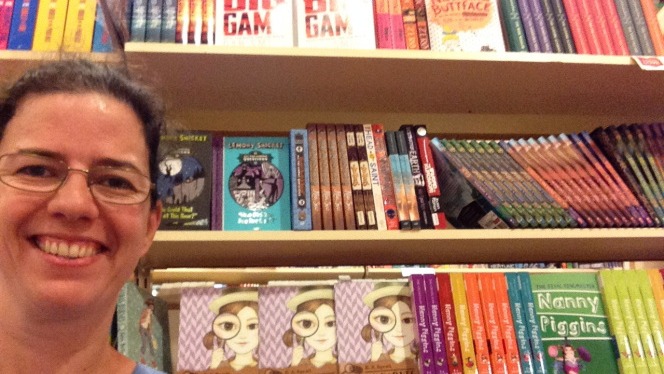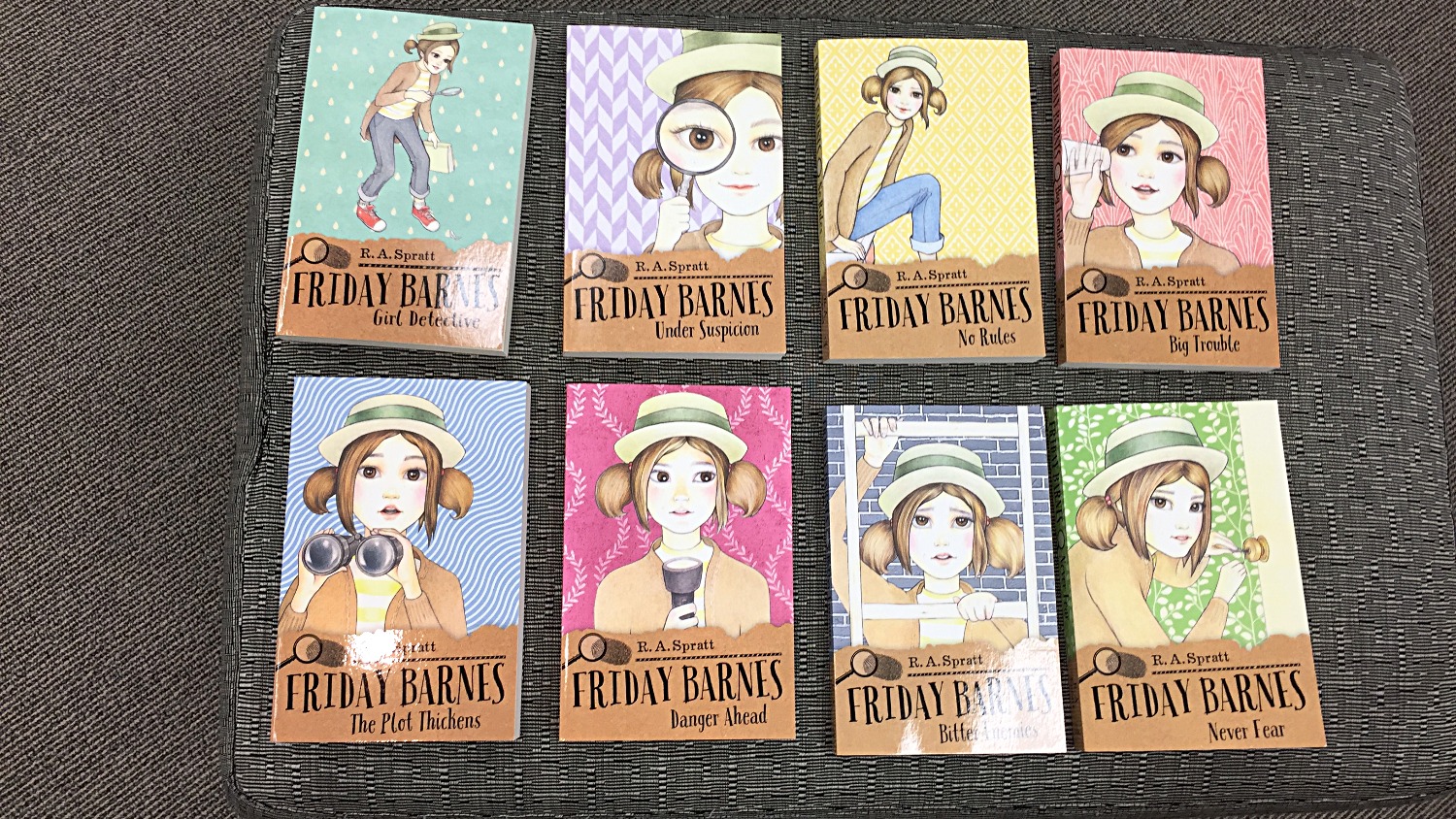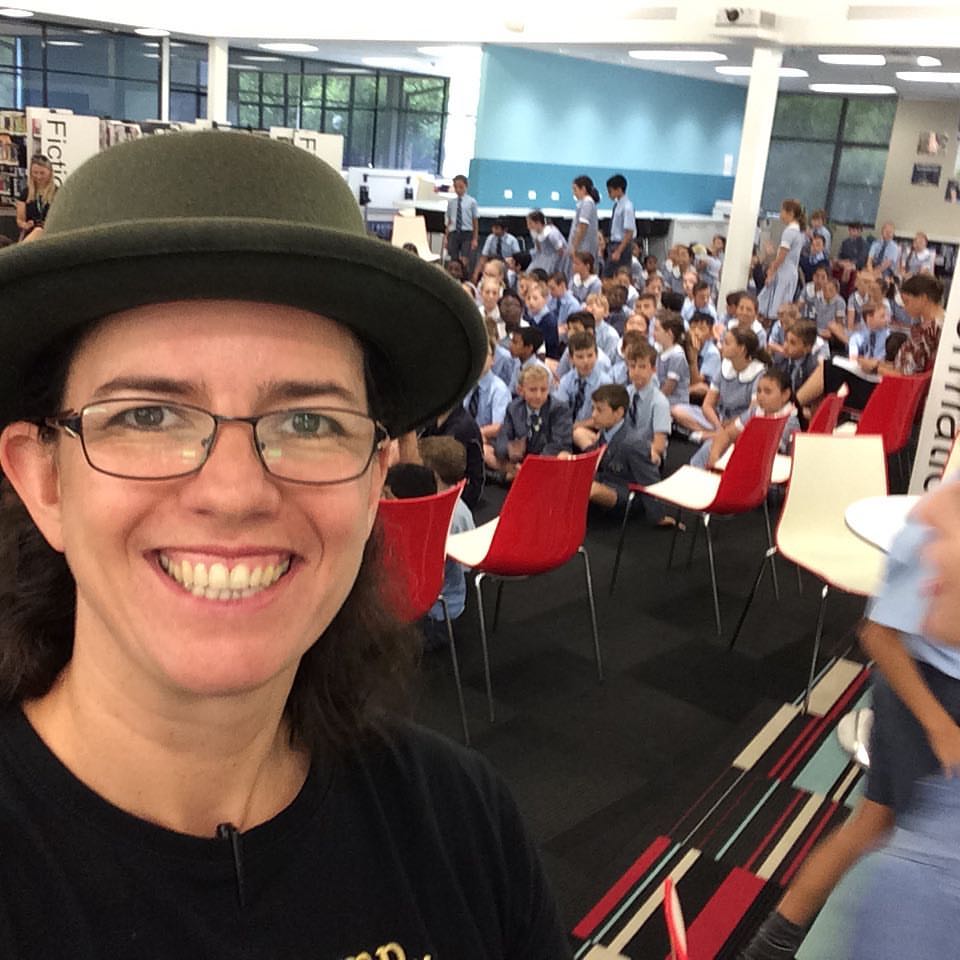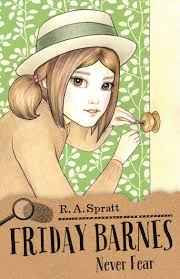R. A. Spratt is an award winning author and television writer, best known for her two series’ Nanny Piggins and Friday Barnes, Girl Detective. Her first book The Adventures of Nanny Piggins was published in 2009 and she has continued on to publish 17 books so far, and a brand new series called The Peski Kids just around the corner.
Rachel was born in England and now lives in Bowral, Australia with her husband and two daughters when she’s not on tour visiting schools or at book signings either interstate or overseas. Publicising and sharing her stories of the world’s most glamourous pig, Nanny Piggins or quick-witted 11-year-old Sherlock, Friday Barnes takes up a lot of time! She shared this insight among others with Gabbi Conway, student ambassador for the NZ Festival.

Gabbi: Your two main series, Nanny Piggins and Friday Barnes are junior fiction. Personally, I tend to write fiction that I would read myself and are aimed for my age group. For example when I was 9 I was writing fairy stories and now at 16, I prefer dystopia. As a young reader, did you particularly enjoy the genre of books in which you write now?
Rachel: I always enjoyed comedy. And I have always enjoyed detective stories so I guess the answer is yes. But I’ve always read very widely and I think my books are influenced by many books other than the genre that they are in. When I re-read Nanny Piggins I can tell that it was very influenced by Anthony Trollope’s Barchester series, because I had just read that and I loved his conversational style.
G: I find it very impressive that you are able to write from a child’s P.O.V, are there any methods you use to be able to do this, or does it come naturally?
R: I think the trick is not to think about it too much. I don’t think of a child’s voice as being particularly dissimilar to an adult’s voice. Children are as intelligent and complicated as adults, they just haven’t been on the planet as long. When writing for a character, I focus more on their motivation, or the way they think. Are they a literal or lateral thinker? Are they empathetic or observant? Are they vain or bitter? Once you have a handle of that for a particular character it becomes the issues that concern them day to day that makes the subject matter child orientated.

G: any of your books are in two series’. What is it about a character that you create that inspires you to continue to explore their story? How do you know when you should conclude their adventures?
R: Authors like me write series because of financial imperative. In the small Australian/New Zealand market it is a better business model. If you are striving to make a living as an author it works better to write series fiction. It is easier to sell 100,000 in a series with 8 titles than it is to sell 100,000 books for a stand alone. A series will build as a brand and that will drive sales as each subsequent book is released.
It wasn’t my decision when Nanny Piggins ended. I could have written another thirty of those books. I chose to end Friday Barnes on eight books because I thought eight was enough. Eight is a lot, in fact. It represents four years of my life’s work. Plus it is hard to come up with mystery plots. I didn’t want the quality to dwindle.
It is easier to sell 100,000 in a series with 8 titles than it is to sell 100,000 books for a stand alone.
G: I understand that you have been writing for quite a while now. Did you write for enjoyment before your internship with ‘Good News Week’ productions? Was there any moment when you realised you wanted to be a writer, or did it result from your life experiences?
R: I wrote things before GNW but it was always with a purpose. I didn’t write for the fun of it. I wrote short film scripts because I wanted to make short films and I wrote jokes about the news because I was hosting a news show on the local radio station. I realised I had a talent for writing when I started writing scripts with dialogue. It didn’t really occur to me that I could do it for a living until I had been offered a job at GNW.

G: Do you find writing each book takes a long time? How long does it roughly take you to write a book, and has the length of the writing process changed over time as you have become more experienced?
R: I write a book every 6 months. The length of that process hasn’t changed much. I’ve always been very efficient in my time management. Actual writing takes up a surprisingly small amount of my weekly schedule.
But authors have to spend an enormous amount of time doing things like this – interviews as well as publicity, school visits, bookstore events, signing bookmarks, signing bookplates, appearing at festivals. I’m on tour for about 50 days of the year. That works out to about ten trips either up to the city, interstate or overseas. In addition to that I have my family to take care of, so it can be frustratingly hard to find the time to actually write.
G: You have also written for TV shows. What is that process like, and how is it different from writing a book of your own? What do you like about each?
R: Writing for television is very different. The process is very structured. You have to learn what the creators want from each character, the location and that shows style. You get notes from a great many producers, often in different countries and you have to do as you are told.When you write a book you have complete creative freedom. It is surprising how little publishers want you to change, and even then, you can say ‘no’ if you particularly want to.
The best thing about writing for TV is the money. The best thing about writing books is the creative freedom and being able to take credit for your work.
The best thing about writing for TV is the money. The best thing about writing books is the creative freedom and being able to take credit for your work.
G: You have two daughters. Do you find that little pieces of their personality are occasionally written into Friday Barnes or the children that Nanny Piggins looks after? Can you give us some examples if they are?
R: Not really. Sometimes I borrow ideas from their school lives. For example, their school celebrated it’s sesquicentenary and I thought that was a funny word, so I had Highcrest celebrate a sesquicentenary.
G: Like many characters in children’s novels, Friday Barnes is a child who is more or less left to her own devices by her parents. Why did you keep her parents at a distance?
R: A parent would inhibit plot. A parent would solve a lot of problems for their child, which would be boring for the reader. And a parent would point out irrational behaviour and prevent dangerous things from happening, which would, again, be boring.
A parent would inhibit plot.
G: Your Friday Barnes novels include many mysteries that your character solves. Do you have a process to create these mysteries and their solutions? How do you ensure that these are difficult enough for readers not to solve before the culprit is revealed?
R: Usually, I come up with the solution first, then work out the plot backwards. Then I have to make sure the clues are there but not too obvious (this is referred to as ‘putting the gun on the mantlepiece’), and then I have the characters digress about all sorts of random things so there are any number of red herrings. The hardest bit is coming up with the idea. Writing it out is not too hard, because unlike the reader I know exactly who did it and why.

Friday Barnes: Never Fear
By R. A. Spratt
Published by Penguin Random House Australia
ISBN 9780143784203
RRP: $20.00
R. A. Spratt is at NZ Festival Writers & Readers, 8-11 March 2018 in Wellington. She is involved in Schools Day, and is running a ‘Writing Comedy‘ workshop. Her public session is R. A. Spratt: Funny Ha Ha, on Saturday 10 March at 11.30am. This content is as a result of the 2018 New Zealand Festival Student Ambassador programme, of which Gabbi Conway is a part.
Gabbi Conway
Gabbi Conway is a Year 12 at Newlands College and lives in Wellington, New Zealand. With a keen interest in writing and theatre, Gabbi has had her short story 'Moments' published in the Young NZ Writers 2016 anthology, is a member of her schools creative writing club and participates in her school's annual productions. Gabbi is a high academic achiever; she particularly enjoys English, Science and Drama. Outside of school, she enjoys staying active, watching Netflix and going to the beach with her friends.



